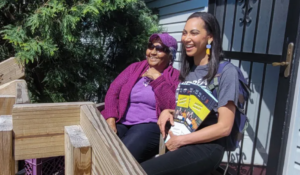Some NYC schools see more families opt out of state tests amid rising anxiety

Rosa Diaz gave her fifth grade daughter a choice ahead of last month’s English state test: Did she feel ready to take it, or did she want to sit it out?
“I believe in you,” the East Harlem mom recalled telling her daughter. “I know you can do everything you want to do, but I want you to tell me if you feel prepared.”
The 10-year-old, who is on the autism spectrum, told her mom she felt ready. Her school, P.S. 171 Patrick Henry, had done a fair amount of test prep.
But after the first day of testing, the girl came home exhausted, Diaz recounted. She immediately took a shower and went right to bed without eating. The same thing happened the second day. Things were worse for some of her peers, Diaz said, with some children staying after school for hours trying to finish the exam.
Now, with state math tests approaching on April 26 and 27, Diaz has made the choice herself. She’ll have her child sit out. And several other parents at her school are doing the same, Diaz said.
This year marks the first time, as far as Diaz is aware, that any parents at P.S. 171 have opted their children out of testing (not counting last year’s one-time opt-in policy). Some other schools in the neighborhood are also seeing their first families opting out, according to parents and school leaders. The small, but growing numbers are notable since the opt-out movement has typically been more popular in white, affluent suburbs than in New York City. P.S. 171’s students are predominantly Black and Latino.
“Parents don’t know what it is to opt out, especially if they speak another language,” said Diaz, a parent leader on District 4’s Community Education Council who has been telling other Spanish-speaking parents about their rights to opt out and figuring out ways to communicate with families who speak various African languages.
The state typically doesn’t report opt-out numbers until the exam results are shared at the end of the summer, city officials said. But Diaz’s experience suggests concerns around student anxiety and academic challenges after prolonged learning disruptions may be spurring more families to say no to testing.
On top of the state tests, students have been taking other assessments throughout the year in English and math as part of the city’s academic recovery plan. The aim of the assessments, city officials said, was to understand where there might be learning gaps. Federal officials declined to cancel last year’s state tests for similar reasons: They hoped to understand how students have fared academically during the pandemic.
National testing data shows dismal results, with progress stalled especially for younger students. Black, Latino, and low-income students were hardest hit. But experts have also questioned the value of the recent data from New York state exams, because last year’s unusually low participation rate makes it hard to draw comparisons.
New York City Schools Chancellor David Banks recently decried the amount of time schools spend on test prep for standardized exams, saying schools have become like “testing mills” at the expense of the arts and other courses that engage students, as well as social emotional learning.
The tests, however, are mandated by the federal government, and schools with low scores can find themselves on state lists of schools needing more oversight.
U.S. Rep. Jamaal Bowman, a former Bronx middle school principal who was a vocal supporter of opting out of the state tests, said he’s drafting legislation to remove the federal requirement that states administer standardized tests. He would rather let states choose alternatives such as testing just once in elementary, middle and high school. He also wants to delink the standardized tests from Title I funding.
“Why are we spending so much time on testing? It doesn’t get us to our goal of 100% literacy and ending the achievement gap,” Bowman said. “There are more complex challenges, like climate change, racial injustice, inequality. We need to prepare children for that world.”
Kemala Karmen, a parent activist with the grassroots group NYC Opt Out, lamented how much time children were spending taking tests this year, between the state tests and the English and math assessments the city requires schools to administer three times a year.
Karmen said many educators have told her they have not gotten the results of these assessments or have had little training to interpret them to change their practice. The state English and math test results are not released until after the school year is over.
“Even if you think learning loss is a real thing, how is taking time out for tests going to help?” Karmen said.
She also said that she’s heard more reports from families about schools pressuring their children to sit for the tests, erroneously saying they needed the results because of COVID-related learning loss.
Some districts are more open to opting out
Some New York City schools and districts are more supportive of letting parents opt their children out. In East Harlem’s District 4, a previous superintendent tried to quash discussions of opting out of the state tests, said parent leader Kaliris Salas-Ramirez. But the current superintendent supported discussions on the topic. And Salas-Ramirez — who is not only the president of District 4’s Community Education Council but was also recently appointed by the Manhattan borough president to serve on the citywide Panel for Educational Policy — has helped raise awareness in her district.
“The last two years we have had conversations at our [Community Education Council] meetings, and the superintendent has encouraged principals to engage the parent community,” Salas-Ramirez said.
At Central Park East I, where her son attends, roughly 65% of students opted out, Salas-Ramirez said. In some years, as many as 80% of children declined the test, but the numbers went down after the school landed on a state Comprehensive Support and Improvement Schools list.
At the Neighborhood School, a small school in the East Village where nearly 75% of students are Latino or white, about 94% of children opted out of the tests, according to Peter Liam, a dad of a fifth grader who led the charge organizing families around opting out. That was up from an average of 80% in recent years, Liam said.
The school does not do test prep, Liam said, so he gave his daughter some samples to see how she felt about taking the exam given her anxiety around testing. He decided to opt her out because she didn’t feel ready. Other parents followed suit.
“There’s safety in numbers,” Liam said.
He acknowledged that some parents still worried about whether not taking the test would affect middle school admissions. (This year and last, admissions were lottery-based, but the city has not yet said whether it will allow schools in the future to screen students based on test scores or other measures.)
Stressed before the test, nervous afterward
For some children anxious about taking the English exam, things didn’t turn out to be as stressful as anticipated.
Before this month’s English tests, Heather Osterman-Davis’ fifth grade son, Owen, wrote a note to Banks and the education department about the effect of the test prep on mental health. Osterman-Davis posted the note on Twitter.
“Too much test prep makes it bad for your mental health,” Owen wrote. “We have done test prep straight for the last few weeks, only with breaks on the weekend. Its impact on me has made me very depressed.”
In the end, Owen took the English test and found it “easier” than he anticipated and “way more relaxing than test prep was,” his mom recounted.
Now he’s waiting for his results, which aren’t likely to come until the end of summer at the earliest.
“It was still kind of stressful, but I think I did good on it,” he said. “But I hate that I have to wait so long for the grades, because that makes me nervous, too.”
This article was originally posted on Some NYC schools see more families opt out of state tests amid rising anxiety





